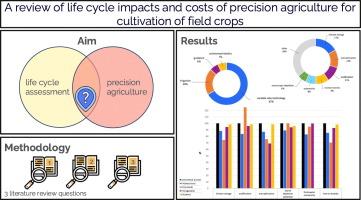大田作物种植精准农业的生命周期影响和成本审查
IF 9.6
1区 环境科学与生态学
Q1 ENVIRONMENTAL STUDIES
引用次数: 0
摘要
基于生命周期思维和评估对作物生产中的精准农业进行评估,可以在系统层面上考虑多个环境和经济方面。然而,这方面的研究明显不足。本综述论文旨在了解针对不同农作物生产方式(果园、蔬菜、露地作物等)、地区以及在各种情况下应用的精准农业技术类型的环境和经济学研究现状。我们采用系统综述和元分析首选报告项目的方法来回答三个综述问题,从环境和经济角度以及全球层面来探讨与大田作物生产相关的精准农业技术的目标子集。在许多生命周期影响类别中,化肥生产/使用和相关的田间排放是造成环境影响的主要原因,能源和农药的使用也有很大影响。在大多数环境影响类别中,与传统做法相比,精准农业做法的使用减少了这些影响。许多精准农业技术侧重于氮肥管理,即养分的可变施用率,但在高价值作物方面却不成比例。有证据表明,可变施肥量管理可减少许多环境影响,但不一定是所有环境影响。一些研究报告称,精准农业技术没有带来经济效益,或经济效益有限,但总体结果表明,精准农业的利用通过节约成本、节省投入和/或提高产量、利润率或利润带来了经济效益。就减少环境影响和经济效益而言,变速技术是精准农业技术中很有前景的一个子集。本文章由计算机程序翻译,如有差异,请以英文原文为准。

A review of life cycle impacts and costs of precision agriculture for cultivation of field crops
Assessing precision agriculture in crop production based on life cycle thinking and assessments allows for the consideration of multiple environmental as well as economic aspects at a systems level. Research at this intersection is, however, notably lacking. This review paper seeks to understand the current state of both environmental and economics research with respect to different agricultural crop production methods (orchard, vegetable, open field crop, etc.), regions, and the types of precision agriculture technologies applied in each context. The Preferred Reporting Items for Systematic Reviews and Meta-Analysis method was used to answer three review questions to address a targeted subset of precision agriculture technologies relevant to field crop production, from both environmental and economic perspectives and at the global level. Fertilizer production/use and associated field-level emissions are the leading cause of environmental impacts in many life cycle impact categories, and energy and pesticide use also contribute significantly. For most environmental impact categories, the utilization of precision agriculture practices reduced these impacts as compared to conventional practices. Many precision agriculture technologies focus on nitrogen management, namely variable rate application of nutrients, but disproportionately in the context of high value crops. There is evidence that supports the notion that variable rate fertilization management leads to reduction in many but not necessarily all environmental impacts. Some studies reported no, or limited economic benefits associated with precision agriculture technologies, however overall results suggest that precision agriculture utilization delivers economic benefits either via cost savings, input savings, and/or increases to yield, margin, or profits. Variable rate technology is highlighted as a promising subset of precision agriculture technologies in terms of environmental impact reductions and economic benefits.
求助全文
通过发布文献求助,成功后即可免费获取论文全文。
去求助
来源期刊

Sustainable Production and Consumption
Environmental Science-Environmental Engineering
CiteScore
17.40
自引率
7.40%
发文量
389
审稿时长
13 days
期刊介绍:
Sustainable production and consumption refers to the production and utilization of goods and services in a way that benefits society, is economically viable, and has minimal environmental impact throughout its entire lifespan. Our journal is dedicated to publishing top-notch interdisciplinary research and practical studies in this emerging field. We take a distinctive approach by examining the interplay between technology, consumption patterns, and policy to identify sustainable solutions for both production and consumption systems.
 求助内容:
求助内容: 应助结果提醒方式:
应助结果提醒方式:


